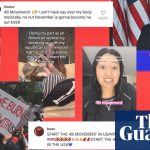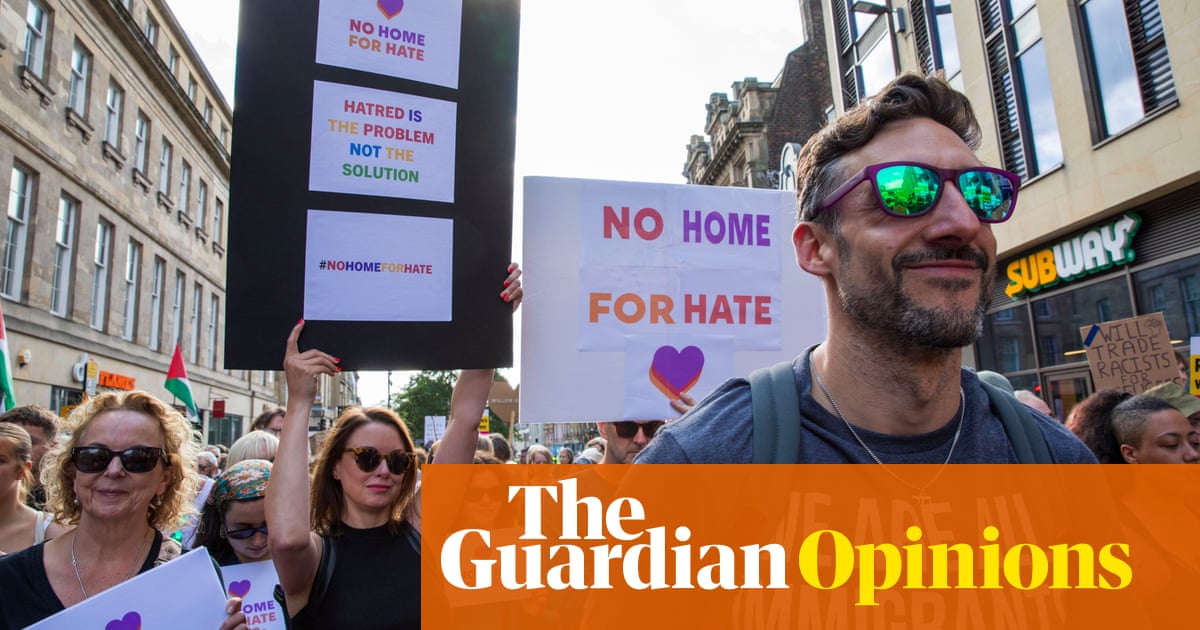In some ways, the counterprotests across the UK against the far right have been a straightforward, much-needed good news story. A great array of people, right across the country, mobilising almost spontaneously to protect refugees, Muslims and other minorities from the worst wave of racist attacks for decades. The counterprotests are a sign that this country has become less tolerant of racism and more politically engaged, in a fundamental rather than party-political sense.
At the counterprotest I went to in north-east London, people of different ages, races, sexualities and religions filled the road and pavements. The crowd was tense at first, but then grew chattier, almost festive, as it became clear that the racists weren’t going to turn up.
Yet taking part in one of these actions is more complex than it first seems. Are you there just as a decent citizen, or as a committed anti-racist? Is your presence a one-off – a desire for a novel experience, even – or a long-term commitment? And what are you prepared to do if the far right actually arrive? These are questions we may have to ask ourselves if their toxic campaign continues.
At the north-east London gathering, 50 yards away from the main crowd, a line of mostly young Muslim men blocked the street outside a mosque. They were chatting like everyone else, but some of them were wearing masks and had their hoods up. Their response to any racist threat, it seemed likely, would not be to ask for peace and love.
The politics of this unexpected season of disorder are treacherous for the main parties. The Conservatives have done so much to cause the violence through their language and policies. Labour, new in government and often misrepresented as soft on law and order, needs to show it hasn’t lost control. Meanwhile, both parties do not want to alienate dissatisfied white men – of whom the rioters are only the most extreme example – partly because since Brexit they have been seen as a key electoral demographic. Anger against the status quo is an energy both parties would like to coopt and redirect.
Labour ministers have used the need for public order to justify their tough treatment of the rioters and to avoid supporting the counterprotests. Tory cuts have made policing thousands of stirred-up people on the streets even harder. Yet the government’s simple, stern approach is also an attempt to make the whole situation less political. Racism, Islamophobia and hostility to immigrants, and the counterreactions these bigotries provoke, have often been tricky issues for our mainstream politicians, conscious of how these topics divide society, and not always along party lines.
This country’s last comparable surge of far-right violence was also under a Labour government, with an economy and public services under strain as now. Between the 1974 and 1979 general elections, the National Front (NF) – an openly racist party which advocated that all ethnic-minority Britons “immediately be disenfranchised” and then rapidly “repatriated from this country” to their supposed countries of origin, even if they had been born in Britain – more than doubled its vote. At the same time, NF members, voters and sympathisers regularly marched through multiracial areas and attacked homes, businesses and local residents, sometimes fatally.
Then as now, many mainstream politicians, while not supporting racist violence, saw anti-immigrant feelings as justified. In 1978, the then Tory opposition leader Margaret Thatcher said that the NF was gaining support because “they are talking about some of the problems” of immigration. She adjusted her party’s language and policies accordingly.
When many thousands of people mobilised against the NF, in Asian areas of London where racist murders had taken place, such as Southall and Spitalfields, and nationally through new anti-racist organisations such as the Anti-Nazi League and Rock Against Racism, the response of the police and the political establishment was often cool or actively hostile. Officers formed massive cordons to enable NF marches and meetings to take place, and often treated anti-racist counter-demonstrators with aggression and contempt. In 1979, days before Thatcher’s increasingly xenophobic Tories won the election, a white anti-racist, Blair Peach, was killed while trying to leave a demonstration against the NF in Southall, almost certainly by a police officer who has never been named.
There are some signs that we live in a different country now. The counterprotests have been praised by the Metropolitan police commissioner, Mark Rowley, the mayor of London, Sadiq Khan, and, in cautiously general language, by King Charles. Police officers are a target for the far right, rather than their protectors. Public attitudes towards immigration and multiculturalism, while volatile, have gradually become more favourable. And whereas in the 70s white participants in anti-racist events tended to be young and seriously political, often activists from trade unions and fringe leftwing parties, this summer’s mobilisation against the far right has drawn in pensioners, the middle-aged and relatively apolitical people as well.
Even the rightwing press, its instinctive prejudices temporarily outweighed by a fear of falling out of step with its readers, has felt compelled to cover the counterprotests positively at times. “United Britain stands firm against thugs,” said the Daily Express last Thursday, above a front-page picture of massed counterprotesters in a left-leaning part of London, as if the paper had momentarily been taken over by an anti-racist collective.
And yet, such vital, photogenic political victories need to be considered alongside much less uplifting, equally lingering experiences – of people of colour closing their businesses early, or too scared to go out, as if subject to some racist lockdown – if the damage the far right has done over the past fortnight is to be understood and then reversed.
Keir Starmer, the ex-prosecutor, is making sure that plenty of violent racists go to prison, but their obsessions will not be so easily confined. When and if the next racist surge comes, how the state, society and the media respond will again reveal with startling clarity what kind of country we are becoming: one actively committed to multiculturalism, grudgingly accepting of it, or still fundamentally hostile. This summer’s riots may be ancient history by the time this is resolved.












